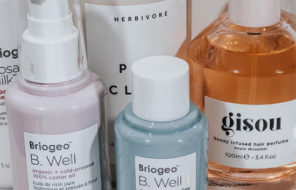It’s time to focus on coconut oil for hair since I’ve already said all there is to say about coconut oil for skin. Coconut oil benefits for hair are many, but it’s still a polarizing ingredient that doesn’t work for everyone. I’ll try and demystify this ubiquitous hair ingredient, so you’ll know exactly what it’s about and how to get the most out of it.
If you’ve tried coconut oil before and it left your hair feeling dry or looking lifeless, then this article is for you. Coconut oil really might be the secret to silky soft hair, but you have to know how to use it. I will explain why coconut oil is used in hair care, and I even get deep into the science of why coconut oil can be so darn good.
Then I’ll go into detail about the specific coconut oil benefits for hair, which will then make it easier to understand which hair types coconut oil is best for and when it might damage the hair. I’ll clear up some myths and answer once and for all whether coconut oil is any good for hair growth. To finish things off, I’ll talk about the various coconut oil uses for hair, so you can make the most out of this fantastic, accessible, and natural hair care ingredient!
In this article:
- Why Use Coconut Oil in Hair Care?
- All the Coconut Oil Benefits for Hair
- What Hair Types Can Benefit from Coconut Oil?
- When Will Coconut Oil Damage Hair?
- Coconut Oil for Hair Growth: Does It Really Work?
- All the Coconut Oil Uses for Hair
Why Use Coconut Oil in Hair Care?
Coconut oil is one of the few botanical oils that are comprised primarily of saturated fats. While saturated fats are not great for consumption (which is why we, as well as the American Heart Association, do not recommend eating too much coconut oil), they are phenomenal to both skin and hair.
The two main fatty acids in coconut oil are lauric acid and myristic acid. On the molecular level, these fatty acids are straight enough and short enough to penetrate into the hair shaft, where they bind to the proteins in the hair. No other oil is able to penetrate and bind to the hair as well as coconut oil. This can have many benefits, depending on how coconut oil is used.
One of the most remarkable coconut oil uses for hair is before or during the shower, since normally when the hair gets wet the inner part of the hair strand, the cortex, becomes saturated with water. This causes the cortex to swell, which raises up the outer part of the hair, the cuticle. This makes the hair more prone to damage, as the strands rub against each other and become weaker. It can also cause serious frizziness and make the hair look very dry.
All the Coconut Oil Benefits for Hair
Some of the most appreciated coconut oil benefits for hair are discussed below, and as you read this piece, you are sure to add this magical oil to your hair care routine as well!
Quick Penetration
Because of coconut oil’s unique molecular structure, it is one of very few hair oils that can penetrate very deeply into the hair shaft, where its affinity for the hair’s proteins (i.e. its polarity) keeps it in place while also preventing protein loss. This is the most unique and important of the coconut oil benefits for hair.
Studies show that coconut oil penetrates into the hair very significantly within an hour. Whereas most other oils will sit on top of the hair or slightly below the cuticles, or they might take many hours to penetrate fully, coconut oil gets all the way to the central cortex of the hair shaft and then it really sticks around.
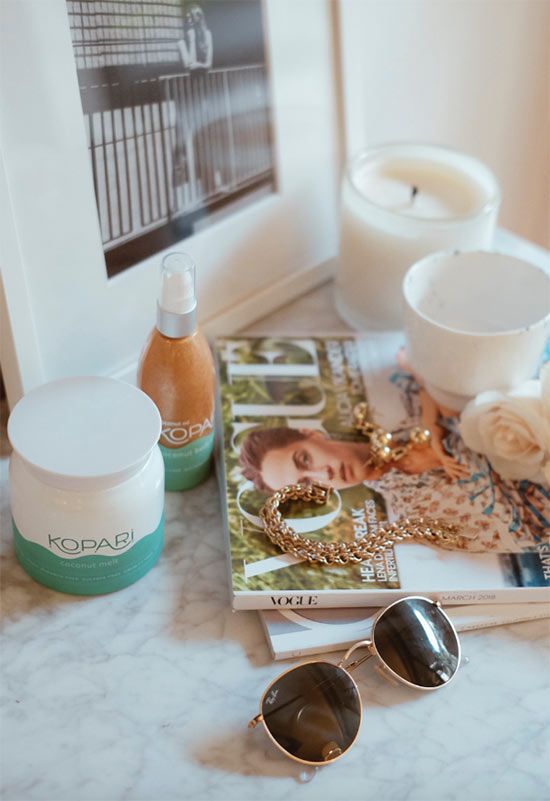
Prevents Excessive Moisture Getting in
Like almost all other oils, coconut oil for hair is hydrophobic, meaning that it repels water. During a shower or on very humid days, our hair (especially if it has high porosity) gets saturated with water. When the hair is saturated with water its inner layer of cuticles swells, causing the outer hair cuticles to stick up – this causes the hair to get frizzy, but also makes it much more prone to damage like breakage or split ends.
Applying coconut oil to hair before a shower can prevent this whole process, since coconut oil is able to saturate the hair so thoroughly that it blocks water from getting into the hair and causing damage.
Prevents Moisture Loss
In the same way that coconut oil can prevent water from getting in to the hair, it can also prevent water from getting out. While we don’t want our hair to be super saturated with water, we also don’t want it to be totally dehydrated, especially if we have hair that is prone to dryness.
When a small amount of coconut oil is applied to the hair after or during a shower, it will help prevent the water that has saturated the hair from evaporating.
Prevents Protein Loss
A study conducted on sunflower oil, mineral oil, and coconut oil for hair showed that coconut oil was able to reduce protein loss in both damaged and undamaged hair when used as a pre- and post-shower treatment, likely due to its high polarity and ability to penetrate the hair. Because of this, coconut oil is a great boost to hair that is prone to breakage, has high porosity or is about to undergo some sort of processing that will deproteinize the hair like bleaching or perming.
On the other hand, this is also the reason why coconut oil can make some people’s hair feel crunchy or dry – not everyone’s hair is in need of intense protein retention!
Smoothes Frizz and Flyaways
Coconut oil has a creamy texture, with an emollient effect. This means that in addition to saturating the hair, it will also help smooth down the cuticles of it, which will make the hair softer, smoother, and less likely to get frizzy.
This effect is not unique to coconut oil, as all oils have a lubricating effect, but some people do find that they prefer the heavier texture of coconut oil and its ability to soak in, especially when compared to lighter oils.
What Hair Types Can Benefit from Coconut Oil?
I’m of the opinion that the benefits of coconut oil for hair come from the way it’s used, and that most hair types can benefit from it – it’s just imperative that they don’t all use it in the same way! There are a few factors that apply when trying to figure out if coconut oil is best for you.
Coconut Oil and Hair Porosity
Coconut oil is by far the best for high porosity hair, since that is the hair that is most likely to get damaged by too much moisture getting in it, which can lead to frizziness, damage, and loss of proteins. Porosity refers to how densely the proteins in the hair sit next to each other, and is often also correlated with coarser hair texture.
The denser the proteins in the hair, the lower the porosity, and the harder it is for water to get in. It’s quite easy to figure out if your hair is very porous or not. Take a strand of your hair, and place it in a bowl of water. If the hair floats, then the porosity is low, while if it sinks then it has high porosity.
For those whose hair has high porosity, coconut oil is best applied as a protective pre-shower treatment.
Those with low-porosity hair, on the other hand, might either prefer to avoid coconut oil altogether, or to only use it in small quantities after their hair has already been saturated with water in the shower. They can experiment with styling products that contain coconut oil, or coconut oil hair masks that also contain hydrating ingredients like glycerin.
In some cases, only the ends of the hair have high porosity, while the rest of the hair is healthy and intact. In that case, only apply coconut oil hair mask to your ends before hopping in the shower.

Coconut Oil and Hair Condition or Protein Levels
Normally, hair that is in good natural condition will not require much care besides typical shampooing and conditioning. On the other hand, hair that has been bleached, lightened, or over-processed with styling tools will certainly require extra TLC and is likely to benefit from coconut oil.
After a lot of processing the hair loses a lot of proteins so it tends to become brittle or to develop split ends. This is why coconut oil for hair can really come in handy, since it prevents loss of proteins in the hair.
Conditioners and hair masks that contain both coconut oil and proteins like keratin or any ingredient that ends with the word proteins or amino acids will do the best job of strengthening the hair and preventing further damage from taking place.
Those with hair that has sufficient protein levels might find that high amounts of coconut oil turn their hair rigid and dry-feeling. This is because of coconut oil’s affinity for proteins.
If this is the case with your hair, you might want to try using smaller amounts of coconut oil for hair or to only use it or products containing it after a shower rather than before. It is also totally fair if you choose to skip coconut oil altogether.
When Will Coconut Oil Damage Hair?
There are many stories of situations where people used coconut oil hair products, usually before a shower, only to find that their hair felt extremely dry afterwards – maybe even straw-like. These are usually situations where the hair has low porosity and a sufficient protein level, so the coconut oil just blocked moisture from getting into the hair and increased its rigidity. This issue can usually be totally avoided if the coconut oil is used after a shower, when instead of blocking the water from getting in, it will actually seal it into place.
Coconut oil, however, can cause issues to those who are dandruff-prone. Dandruff is actually a form of seborrheic dermatitis, which is most likely a fungal skin issue caused by malassezia. The malassezia fungus feeds on oils, including coconut oil, so applying oil to the scalp can trigger a serious case of dandruff. Try to avoid all hair oils, at least on your scalp, if you think you might have dandruff or other fungal skin issues.
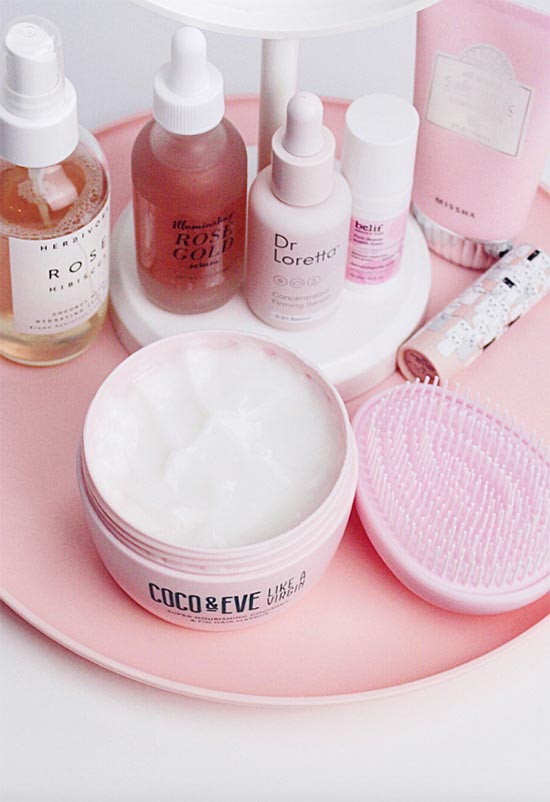
Coconut Oil for Hair Growth: Does It Really Work?
Lots of sources like to tout random natural ingredients as the next solution to hair loss or as the next aid for hair growth, so I’ll be quick to say that coconut oil will not help with hair growth. While coconut oil might make your hair look totally awesome and it can certainly prevent hair loss due to breakage, there is nothing in it that actually stimulates the scalp or the hair follicles, so it has no way of directly speeding up hair growth.
That being said, if one has a dry or sensitive scalp then coconut oil may help overall in moisturizing and soothing the scalp, which may improve its overall functioning. Then again, coconut oil can do the exact opposite by damaging the scalp and reducing hair growth for those already prone to fungal infections like dandruff, so user beware!
All the Coconut Oil Uses for Hair: How to Use Coconut Oil for Hair?
There are many different coconut oil uses for hair, and the best one for you depends on your lifestyle and hair type. Coconut oil might work amazingly for some people in one way, but then totally wreck their hair if used a different way, so keep your goals and hair type in mind before choosing a method for using coconut oil.
The Ultimate Coconut Oil Pre-Shower Hair Mask
The most classic way of using coconut oil for hair is as a treatment before a shower. This could mean leaving it in overnight and washing in the morning, or it could mean applying it 15 minutes to an hour before your shower.
This would be the ideal treatment for preventing the hair from absorbing too much water during your shower, which is usually best for those with high porosity hair that is prone to breakage or post-shower frizz.
To do the pre-shower coconut oil hair treatment, you only need a small amount of oil. The exact amount will depend on the length of your hair, but generally you want the oil to coat your hair very lightly. Using too much coconut oil might make the hair heavy, limp, and lifeless, so it’s better to use too little than too much.
- Take a small amount of coconut oil, and massage it in your hands to warm it up and get it to liquefy. If the coconut oil is very solid, you might choose to melt it on the stovetop or in the microwave.
- Apply the coconut oil to your hair starting with its lower half, and work it out towards the ends. Once the lower half of the hair is nicely covered, use any residue of coconut oil left on your hands to cover the rest of the hair.
- If necessary, take a bit more coconut oil to finish the job. Unless your roots and scalp get super dry, and you are not dandruff-prone, it is generally best to avoid getting too close to the scalp and roots with the coconut oil.
- If you are short on time you can speed up the coconut oil hair penetration by very gently applying heat to your hair with the help of a blow dryer set to a low but still warm temperature.
Note: If you didn’t like the result the first time you’ve done this treatment, it’s possible that you’ve used too much coconut oil. Try this coconut oil hair treatment again with a smaller amount. It’s also possible that your hair has low porosity, and so it doesn’t need the pre-shower protection of coconut oil in the first place.
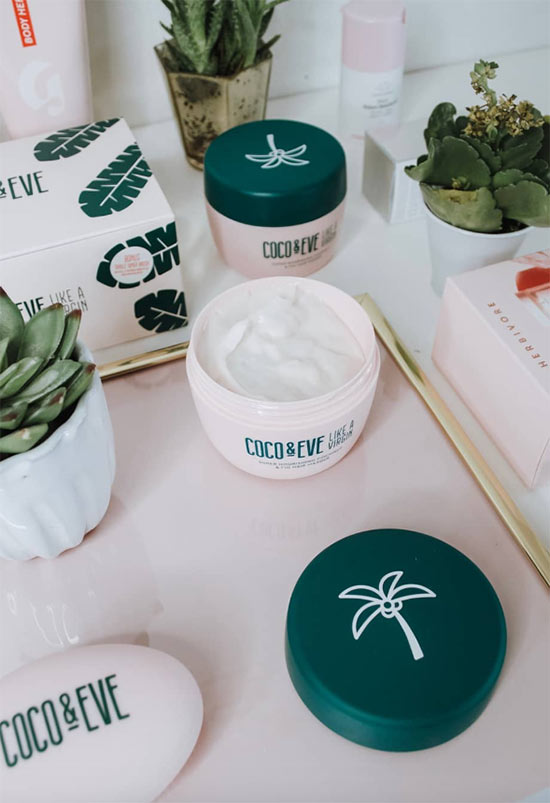
Coconut Oil for Hair Styling
While coconut oil does mostly penetrate, a bit of it does stay near the surface of the hair shaft where it can seal and smooth down the cuticle. Because of this, it can help smooth down flyaways and tame frizz, and it’s even safe to use before heat styling.
For some, all that is necessary is running a touch of warmed up coconut oil through their hair before styling, while for others (especially those with oily hair) coconut oil alone is too heavy, but it can work well in a styling treatment or dry oil formula that also includes some silicones, coconut alkanes, or a blend of lighter oils.
Coconut Oil Deep Conditioning Mask
An in-shower coconut oil hair mask can do a wonderful job of fortifying the hair and locking in moisture. You can apply coconut oil on its own after shampooing your hair and before conditioning it, or, if your hair tends to get dehydrated, make a hydrating mask by mixing in your hand a dollop of coconut oil with few drops of glycerin.
The glycerin will pull moisture into your hair, but the coconut oil will ensure its balanced amount of moisture that won’t cause your strands to swell and lift up your hair cuticles. Let the mask sit in your hair for 5-10 minutes, and the rinse it out.
If you’re not the DIY type, check out of the coconut oil hair masks I’ve recommended earlier in the article! If your hair is brittle due to over-processing, you want to opt for a coconut oil hair mask that also contains proteins, to help fortify and fill in the gaps in your hair shaft.
Pre-Pool Coconut Oil Hair Protectant
Chlorinated water is one of the most damaging things our hair can be exposed to, but coconut oil is one of the best ways to prevent that damage. Before getting in the water, apply coconut oil to your hair much in the same way you would according to the pre-shower treatment.
The coconut oil will saturate your hair from cortex to cuticle (which is just a fancy way of saying from the inside out), and it will prevent the chlorinated water from getting into your hair.
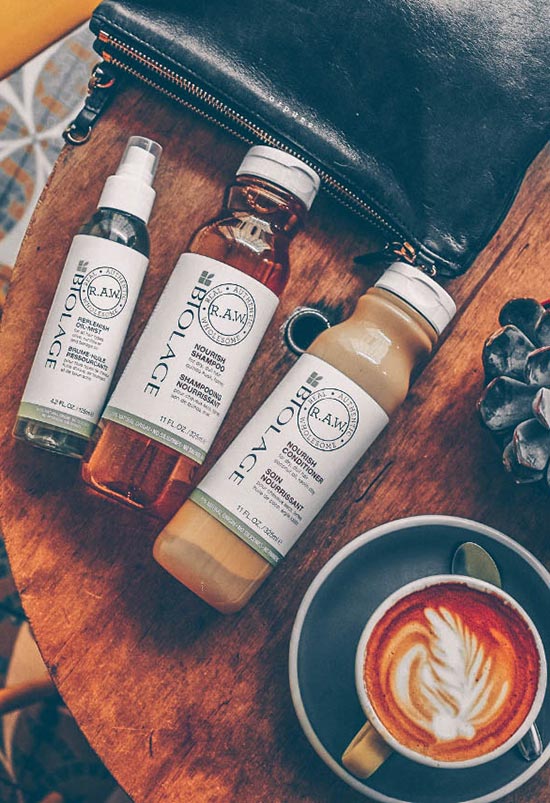
Coconut Oil Hair Shampoo and Conditioner
You can enjoy the strengthening coconut oil benefits for hair by using a shampoo and conditioner set already infused with the oil. This tends to work best for people whose hair cannot tolerate straight oils, although it can also be a nice addition for someone with very high porosity hair that cannot get enough out of coconut oil.
I don’t recommend adding coconut oil to your regular shampoo or hair conditioner, as this can disrupt the preservative system and cause your shampoo or conditioner to grow some gross bacteria.
Photos via @sharypova_nna, Instagram



